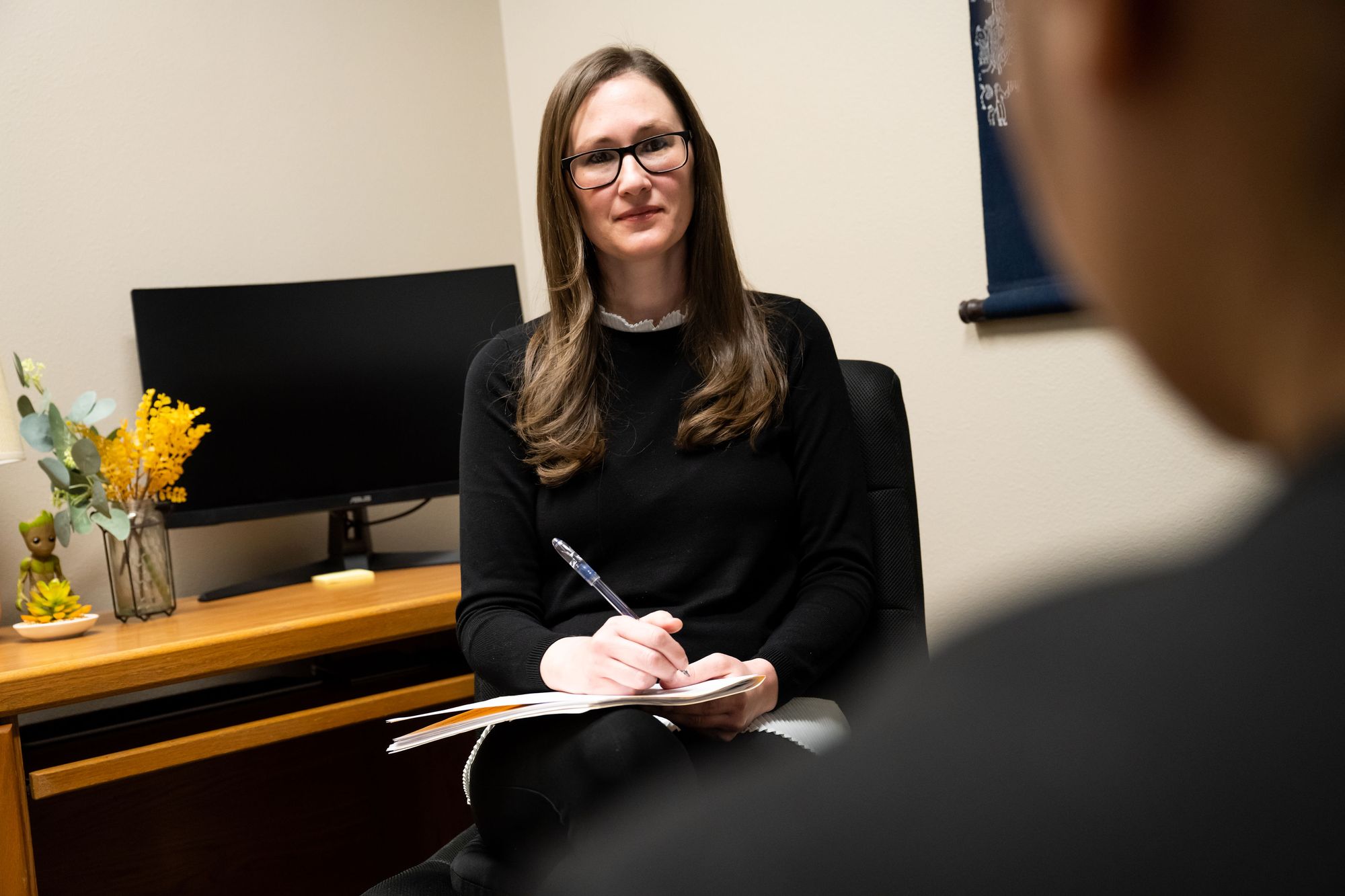“I can’t stop thinking about that mistake I made.”
“My family says I seem angry all the time.”
“I’m stuck and don’t know how to move forward.”
“I just want the pain to stop.”
These are some things that mental health counselors at Grace Clinic hear from clients. Statements like this may indicate depression, anxiety, or other mental health conditions.
Recent events, like the lingering effects of the COVID pandemic and a more divisive political situation, have sent new shock waves of stress and anxiety throughout our culture.
But there’s good news. Every day, qualified mental health counselors are helping people understand their emotions and develop resilience. At Grace Clinic, there is no shortage of help … or hope.
Free mental health care and more trained counselors
As the Tri-Cities’ only free clinic, Grace Clinic provides medical, dental, and mental health services to income-limited adults in the Tri-Cities who lack health insurance, all at no cost to patients.
Last year, we provided 814 counseling sessions for mental health clients.
Dr. Cynthia Preszler, Grace Clinic’s Counseling Director, launched the clinic’s mental health services in 2010. She oversees a rotating group of counseling interns, all of whom are pursuing master’s degrees.
Counseling internships at Grace Clinic are highly sought after, with positions lined up through 2025. Once interns have graduated and become licensed, these counselors typically go to work at agencies, hospitals, schools, or into private practice.
“It’s especially gratifying that of our 42 interns, so far, 22 of them have started their own practices or joined local counseling businesses here in the Tri-Cities,” Preszler says. “So while we’re helping clients at Grace Clinic, we’re also augmenting our community’s mental health treatment capacity.”
Making new brain connections
One of the methods Clinic counselors use is cognitive behavioral therapy. “Our job is to challenge cognitive distortions and help clients rewrite ‘truth statements’ about what’s really happening,” Preszler says.
Cognitive distortions are irrational thoughts and beliefs that people unknowingly reinforce over time.
For example, if your family situation was an unsafe or scary place for you, you may cope by shutting down any negative emotions. Maybe you’ve been told that you’re worthless, or that what you do doesn’t matter. This may limit your ability to set and achieve goals, or to feel a sense of purpose. If you’ve experienced or seen physical, emotional, or psychological abuse, the resulting trauma can have long-lasting effects.
The good news is that trained counselors can help you create new ways of thinking and behaving. “The brain is constantly making new brain cells, an incredible phenomenon called neuroplasticity,” Preszler says. “We help people create new connections in the brain. This changes how they think, which helps them turn in a different direction and become more resilient.”
Resilience is the ability to bounce back from challenges. The more resilient you are, the better you can ‘roll with the punches’ and adapt to adversity. Fortunately, resilience is a trait that can be developed.
Look around; look within
Mental Health America recommends these research-proven behaviors that increase everyday mental well-being:
Get outside. Time in nature helps personal growth, self-esteem, emotional regulation, and social skills. The Japanese have a name for this: forest bathing. Just sitting under a tree — or even adding greenery to your home or workspace — can support your mental health. This year, the L.L. Bean company launched its Feel-Good Challenge, where people across the country work toward a combined goal of 500,000 hours outside during May. More information online: mhanational.org/llbean.
Give yourself light. Sunlight triggers the release of serotonin and vitamin D, which are associated with boosting mood and focus while reducing stress. Light exposure also affects your body’s sleep-wake cycle, one of the most important factors in well-being. Just 10 to 15 minutes of sun on your arms and legs a few times a week can have a big impact.
Shape your home environment. Create comfortable spaces that make you feel happy, cozy, safe, and connected. Encourage healthy habits, like putting fresh fruit on your counter if you want to eat better. Keeping your living space uncluttered and organized promotes calmness and a sense of control. Set your bedroom temperature at 60 to 67 degrees for optimal sleep, and shut down any electronics that emit light and disrupt your body’s circadian rhythms.
Help kids. Parents and teachers can model habits to help children regulate their emotions. Teach behaviors like the ability to calm yourself, learn a skill, express feelings, make choices to build decision-making skills, show empathy, and understand that you love them for who they are. More information: https://www.apa.org/topics/resilience/guide-parents-teachers.
Getting help
When is your situation bad enough to see a counselor? One warning sign, Preszler says, is when it starts affecting your relationships with those close to you.
To find local counselors, enter your city at the Psychology Today listing at https://www.psychologytoday.com/us/therapists. Some are taking new clients. Make sure they are state licensed by checking Washington State Department of Health’s online credential search.
Never ignore someone’s statement about suicide. “It’s a cry for help,” Preszler says. “Don’t be afraid to ask the person if they are thinking about suicide, and if they have a plan.” Call 988, the national suicide hotline. Don’t try to help a suicidal person by yourself; this crisis situation requires a trained counselor.
Difficult life situations can contribute to stress, but help is available. “The Tri-Cities is blessed with wonderful resources, including healthy food, safe outdoor space, public transportation, and quality medical care,” Preszler says. If you are having trouble finding these resources, call 211 or the Kadlec Community Resource Desk at 509-942-2956.
If you lack insurance and need counseling or other basic healthcare, contact Grace Clinic at 509-735-2300. We are located at 800 W. Canal Drive in Kennewick and gracecliniconline.org.
At Grace Clinic, Dr. Cynthia Preszler is Director of Counseling and Andrea McMakin is Communications Coordinator.


